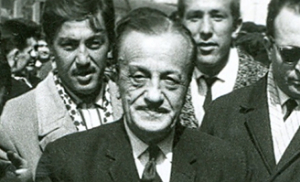The Return of Hakan Fidan to MİT is the Sign of a Power Struggle
By M. K. Kaya (vol. 8, no. 5 of the Turkey Analyst)
The row over Hakan Fidan, Turkey’s reinstated intelligence chief, is suggestive of shifting power realities and rivalries within the AKP regime. Prime Minister Ahmet Davutoğlu suffered a serious setback when he was forced to let Hakan Fidan return to MIT. President Recep Tayyip Erdoğan needed not only to have his confidante back at the helm of the critically important MIT, but also to ensure that the circle around Davutoğlu did not succeed in its bid to become a power centre on its own right. Erdoğan correctly saw the emerging Davutoğlu-Fidan alliance as an alliance that had the potential to reconfigure the power status quo within the AKP.

What the Columnists Say
Fatih Yaşlı in Yurt writes that the evacuation of the Süleyman Şah tomb in Syria symbolizes the end of the neo-Ottoman project of the AKP regime. İbrahim Karagül in Yeni Şafak sees a foreign hand behind ISIS and argues that the operation that evacuated the Turkish soldiers thwarted the designs of foreign powers that were scheming to attack Turkish interests under the guise of ISIS. Etyen Mahçupyan in Akşam writes that Recep Tayyip Erdoğan is not an authoritarian, but that he behaves like that only when he feels under threat. Mahçupyan urges the opposition to create the conditions that will enable Erdoğan to be a democrat. Bülent Korucu in Zaman detects signs that a closure case against the main opposition party CHP may be under way. Ali Bulaç in Zaman writes that the AKP has destroyed Islamism and forfeited a century-old heritage.

The AKP and Turkey’s Long Tradition of Islamo-Fascism
By Toni Alaranta (vol. 8, no. 3 of the Turkey Analyst)
Those who claim that democracy in Turkey has been handicapped because of the repressive “Kemalist” regime overlook that the conservative right has totally dominated Turkish politics. It is the traditions of the Turkish right that need to be scrutinized in the search for the matrix of current undemocratic practices. The Turkish Islamist poet and political ideologue Necip Fazıl Kısakürek is a key figure in this context. He propagated for a totalitarian Islamist-fascist regime in Turkey, to be ruled by an Islamic version of a Führer. And today representatives of the AKP point out that understanding Kısakürek is a precondition to understand the great “cause” (“dava”) that the AKP represents.

What the Columnists Say
Cengiz Çandar in Radikal writes that the AKP has no other raison d’être left than to cling to Tayyip Erdoğan, and to be the power instrument of the supreme leader. Cengiz Aktar in Taraf cautions against harboring “revolutionary hopes” in Turkey in the wake of Syriza’s victory in Greece and the Kurdish victory in Kobane. Fehmi Koru in Habertürk predicts that the HDP, if it crosses the threshold to parliament in the general election in June, is going to be a perfect partner for the AKP in the writing of a new constitution. Bekir Ağırdır on the t24 news site writes that the HDP is going to have to triple its votes in the eight major metropolises in order to have a chance to cross the ten percent threshold to parliament. Finally, Hasan Bülent Kahraman in Sabah observes that HDP and its electoral prospects are now on everyone’s lips and that the party in that respect has succeeded in becoming a party that matters nation-wide in Turkey.

The HDP's Election Gambit and Turkey's Tolling Alarm Bells
By Gareth Jenkins (vol. 8, no. 2 of the Turkey Analyst)
On January 13, 2015, Selahattin Demirtaş, the co-chair of the pro-Kurdish Peoples’ Democratic Party (HDP), announced that the HDP will run as a party in the June 7, 2015 general election. If the HDP fails to cross the 10 per cent national electoral threshold not only will the country’s Kurds no longer have their own voice in parliament but nearly all of the seats in predominantly Kurdish areas are likely to go to the ruling Justice and Development Party (AKP), thus boosting President Recep Tayyip Erdoğan’s hopes of changing the constitution and introducing a presidential or semi-presidential system.








